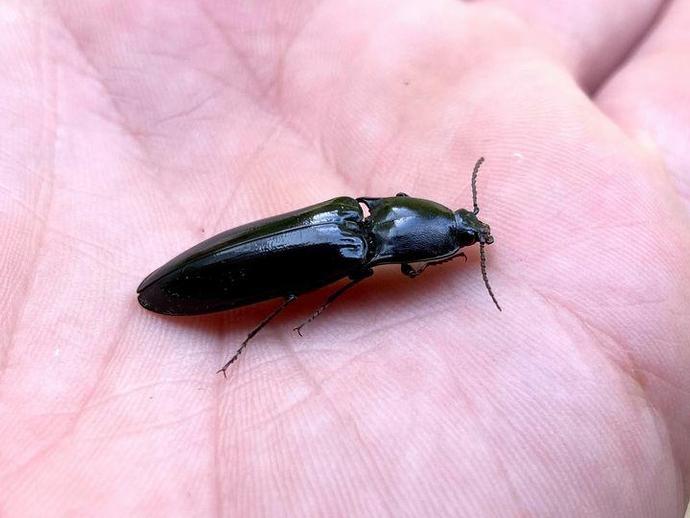November 11, 2021
We're reaching into the archives for today's #BenInNature update presented by our friends at Carter Bank & Trust! The following post was originally published on August 26, 2020.
This is Melanactes piceus, a click beetle that looks like it just left a shoeshine stand! Click beetles belong to the family Elateridae, which contains more than 900 species just in North America and more than 9,300 species worldwide!
This is a larger click beetle, as most species are fairly small and are usually a drab brown or black color. A few species of click beetles are large and colorful, and some are even bioluminescent! The most impressive click beetle you're likely to find in southwest Virginia is Alaus oculatus, commonly called the eastern eyed click beetle. These are large gray beetles with white speckles and two large black eyespots on their pronotum (the plate that covers the thorax or middle section of some insects). A bunch of folks have sent us photos of these striking beetles over the last few months!
Click beetles get their name from their propensity to — you guessed it — click. If you touch a click beetle, it will often roll over onto its back and pretend to be dead. When the moment of danger has passed, the click beetle will bend its head and thorax forward, which latches a little spine into a notch on the beetle's abdomen. When the beetle unlatches the spine, its head and thorax fly backward with enough force to produce an audible click and send the beetle hurtling into the air. If you're stuck on your back, it's a great way to right yourself!
Fun fact: I spent a good 15 minutes attempting to shoot a slow-motion video of this click beetle clicking. It refused to click on camera. I've never worked with a bigger diva.
ABOUT #BenInNature
Social distancing can be difficult, but it presents a great opportunity to become reacquainted with nature. In this series of posts, Administrator of Science Ben Williams ventures outdoors to record a snapshot of the unique sights that can be found in the natural world. New updates are posted Monday - Friday, with previous posts highlighted on the weekends. This series of posts is made possible thanks to the support of VMNH Corporate Partner Carter Bank & Trust (www.cbtcares.com).
NATURE PHOTO IDENTIFICATIONS
If you discover something in nature that you would like help identifying, be sure to message us right here on Facebook with a picture (please include location and date of picture) and we'll have our experts help you identify it!

 Hours & Admissions
Hours & Admissions Directions
Directions

